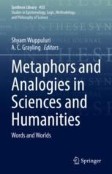Search
Search Results
-
Progressive and degenerative journals: on the growth and appraisal of knowledge in scholarly publishing
Despite continued attention, finding adequate criteria for distinguishing “good” from “bad” scholarly journals remains an elusive goal. In this...
-
Person Skilled in the Art in Synthetic Biology from Iraqi and Malaysian Perspectives
This article presents the problem of a person skilled in the field of synthetic biology. The person skilled in the art is one of the notions which...
-
Prediction and Topological Models in Neuroscience
In the last two decades, philosophy of neuroscience has predominantly focused on explanation. Indeed, it has been argued that mechanistic models are...
-
Post-publication Peer Review with an Intention to Uncover Data/Result Irregularities and Potential Research Misconduct in Scientific Research: Vigilantism or Volunteerism?
Irregularities in data/results of scientific research might be spotted pre-publication by co-workers and reviewers, or post-publication by readers...

-
Synthesis and Similarity in Science: Analogy in the Application of Mathematics and Application of Mathematics to Analogy
Examining different cases, I show that, and how, analogies play a variety of roles in the application of mathematics. Different purposes may involve...
-
Cybersemiotics in the Information Age
Søren Brier’s approach to the study of semiosis in the current Information Age fits in perfectly with the view of Marshall McLuhan that technology...
-

-
Conceptions of Political Action in the Anthropocene: Between Prometheism and Post-Prometheism
This chapter addresses conceptions of political action in the Anthropocene and the tension between a desire to accomplish the Promethean project of...
-
Marx and Laozi’s Ethical Naturalisms
This chapter will construct arguments from Marx’s scientific humanist ethical naturalism and Laozi’s aesthetic, anti-humanist ethical naturalism....
-
Challenges for Responsible Management Education During Digital Transformation
A crucial practical teaching experience with digitization was given by the COVID-19 pandemic when the schools were forced in 2020 to switch to online...
-
What’s all the fuss about? The inheritance of acquired traits is compatible with the Central Dogma
The Central Dogma of molecular biology, which holds that DNA makes protein and not the other way around, is as influential as it is controversial....
-
The evolution of complex multicellularity in animals
The transition to multicellularity is perhaps the best-studied of the “major evolutionary transitions”. It has occurred independently multiple times...

-
Brain age Prediction and the Challenge of Biological Concepts of Aging
Brain age prediction is a relatively new tool in neuro-medicine and the neurosciences. In research and clinical practice, it finds multiple use as a...
-
Improving student success in chemistry through cognitive science
Chemistry educator Alex H. Johnstone is perhaps best known for his insight that chemistry is best explained using macroscopic, submicroscopic, and...

-
Brains in Society: Of the People, for the People, and by the People?
Humans tend to identify the uniqueness of our brains as the cornerstone of human distinction from other animals (Chapman & Huffman, 2019). Our...
-

-
Exploring, expounding & ersatzing: a three-level account of deep learning models in cognitive neuroscience
Deep learning (DL) is a statistical technique for pattern classification through which AI researchers train artificial neural networks containing...
-
Philosophy of sustainability experimentation _ experimental legacy, normativity and transfer of evidence
The recent proliferation of types and accounts of experimentation in sustainability science still lacks philosophical reflection. The present paper...
-
Map** the ‘Ethical’ Controversy of Human Heritable Genome Editing: a Multidisciplinary Approach
Genome editing, for instance by CRISPR-Cas, is a major advancement of the last 10 years in medicine but questions ethically our practices. In...

-
Silencing trust: confidence and familiarity in re-engineering knowledge infrastructures
In this paper, we tell the story of efforts currently underway, on diverse fronts, to build digital knowledge repositories (‘knowledge-bases’) to...
